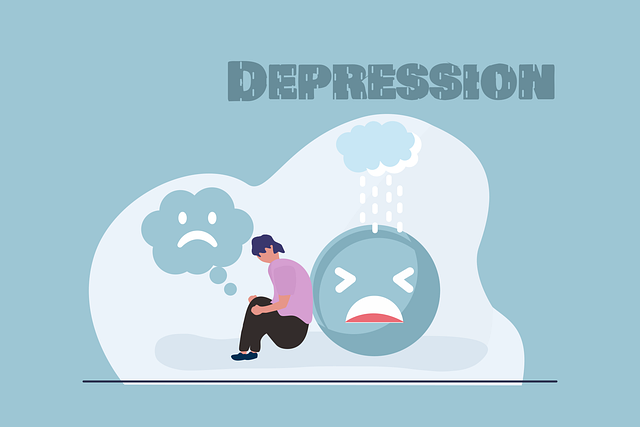Burnout among healthcare providers is a critical issue driven by high-stress work environments, leading to physical and emotional exhaustion. Recognizing signs like cynicism, detachment, and reduced efficacy is essential as it impacts personal well-being and patient care quality. Prevention strategies focus on open communication, emotional regulation, positive thinking, and stress management techniques. Creating supportive work environments with team-building activities, flexible scheduling, and mental wellness resources can reduce stress levels and enhance job satisfaction. Maintaining a healthy work-life balance through self-care practices like exercise, mindfulness, and hobbies is crucial. Professional therapy, such as that offered by Arvada Divorce Therapy, provides essential resources for emotional agility, crisis intervention, and effective coping strategies, ultimately supporting healthcare providers' mental health and enhancing patient care quality.
“Healthcare provider burnout is a growing concern, impacting not just individuals but the broader healthcare system. This comprehensive guide explores effective prevention strategies to combat this rising issue. We delve into the root causes and signs of burnout, emphasizing the critical need for supportive work environments.
From fostering work-life balance to promoting self-care practices, we offer actionable tips. Additionally, we highlight the significance of professional therapy in recovery, drawing insights from Arvada Divorce Therapy’s expertise in mental health support. Discover a holistic approach to well-being and resilience in healthcare.”
- Understanding Burnout: Recognizing the Signs and Causes
- Creating a Supportive Work Environment
- Work-Life Balance: Strategies for Healthcare Providers
- Self-Care Practices to Prevent Burnout
- The Role of Professional Therapy in Burnout Recovery
Understanding Burnout: Recognizing the Signs and Causes

Burnout among healthcare providers is a growing concern, with high-stress work environments contributing to physical and emotional exhaustion. It’s crucial for medical professionals to recognize the signs and understand the causes behind burnout to implement effective prevention strategies. Often characterized by feelings of cynicism, detachment from work, and reduced professional efficacy, burnout can significantly impact both the individual’s well-being and the quality of patient care.
The journey towards preventing burnout involves a multifaceted approach. Effective communication strategies, emotional regulation techniques, and fostering positive thinking can all play pivotal roles. Healthcare providers should prioritize open dialogue with colleagues and patients, practicing active listening and expressing genuine empathy. Additionally, learning to manage stress and maintain a healthy work-life balance are essential. Cultivating resilience through positive thinking and reframing challenging situations can help medical professionals navigate the demanding nature of their careers, ultimately reducing the risk of burnout.
Creating a Supportive Work Environment

In creating a supportive work environment, healthcare providers can significantly mitigate burnout risks. This involves fostering an atmosphere that prioritizes mental health and well-being, much like Arvada Divorce Therapy specializes in for its clients. Regular team-building activities, open communication channels, and flexible scheduling policies can all contribute to reducing stress levels and enhancing job satisfaction. Additionally, providing resources for mental wellness journaling exercises guidance or even producing a mental wellness podcast series can offer valuable outlets for professionals to process their experiences and connect with peers on a deeper level.
Such initiatives not only support individual mental health but also strengthen the collective resilience of the healthcare team. By addressing burnout proactively through these measures, organizations can ensure that their staff remains engaged, compassionate, and dedicated—key attributes in delivering quality patient care, similar to what one might find in a vibrant mental wellness podcast series or therapeutic setting like Arvada Divorce Therapy.
Work-Life Balance: Strategies for Healthcare Providers

Maintaining a healthy work-life balance is a critical component of preventing burnout for healthcare providers. The demanding nature of the profession often leads to long hours and high stress levels, which can negatively impact both professional and personal well-being. To counteract this, healthcare workers should prioritize self-care practices that foster emotional well-being promotion techniques. This includes setting clear boundaries between work and personal time, engaging in regular physical activity, and cultivating hobbies or interests outside of work. By creating a structured routine and allocating dedicated time for relaxation and rejuvenation, professionals can mitigate the risks associated with burnout.
Effective communication strategies are also vital. Healthcare providers should maintain open lines of communication with colleagues, supervisors, and patients to manage workload and expectations. Regular debriefing sessions, peer support networks, and collaborative problem-solving approaches can help alleviate stress and foster a sense of belonging. Additionally, incorporating self-awareness exercises into daily routines, such as mindfulness meditation or journaling, allows professionals to recognize signs of burnout early on and take proactive measures to maintain their mental health. These strategies collectively contribute to a more balanced lifestyle and enhance the overall resilience of healthcare providers.
Self-Care Practices to Prevent Burnout

In the high-pressure environment of healthcare, burnout is a common challenge faced by many providers. However, incorporating self-care practices can significantly mitigate this risk. Taking time for personal well-being and engaging in activities that promote relaxation and rejuvenation are essential components of preventing burnout. For healthcare professionals, this might include regular exercise, mindfulness meditation, or pursuing hobbies outside of work to foster resilience and maintain a healthy work-life balance.
Arvada Divorce Therapy offers valuable resources and guidance for building resilience and coping with stress. Their compassionate cultivation practices can help providers develop emotional agility and effective crisis intervention skills, further enhancing their ability to manage workload pressures. By prioritizing self-care, healthcare workers not only protect their own mental health but also ensure they can continue to provide high-quality care to their patients.
The Role of Professional Therapy in Burnout Recovery

Professional therapy plays a pivotal role in helping healthcare providers recover from burnout and regain their well-being. Arvada Divorce Therapy, for instance, offers specialized services tailored to address the unique challenges faced by medical professionals. The therapeutic process begins with an assessment to understand the root causes of burnout, which often stem from intense work pressures and emotional demands. Therapists employ evidence-based techniques such as cognitive-behavioral therapy (CBT) to help providers manage stress, improve emotional regulation, and develop healthier coping mechanisms.
Cultural sensitivity in mental healthcare practice is another key aspect integrated into the therapeutic process. Trained therapists are equipped to provide trauma support services, ensuring that healthcare providers feel safe and supported when discussing personal experiences. By fostering an environment of trust and understanding, therapists enable professionals to process their emotions, reflect on their experiences, and cultivate resilience. This holistic approach not only aids in burnout recovery but also enhances the overall quality of mental healthcare provided by these professionals.
Preventing burnout among healthcare providers is a multifaceted approach that involves both personal and organizational strategies. By understanding the signs and causes, creating supportive environments, prioritizing work-life balance, adopting self-care practices, and seeking professional therapy when needed – even considering options like Arvada Divorce Therapy for mental health support – healthcare professionals can cultivate resilience and sustain their vital contributions to patient care.














